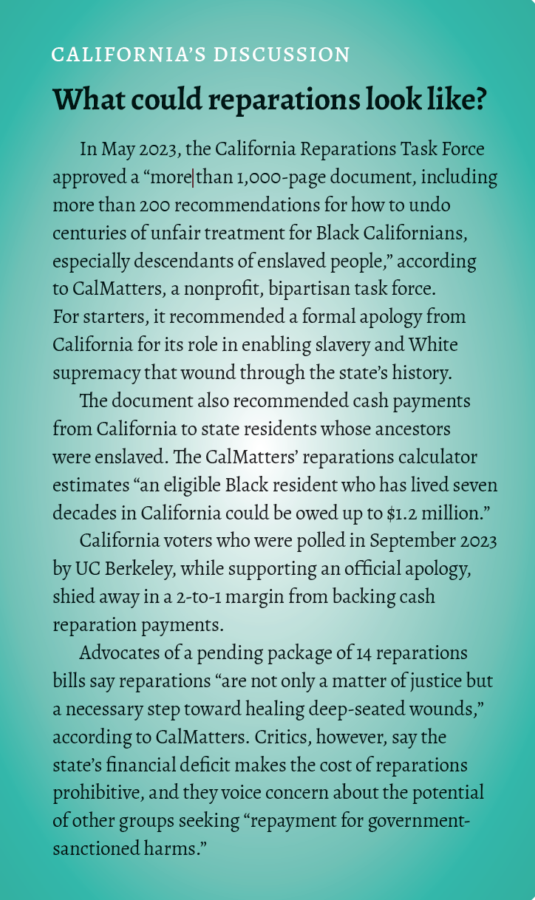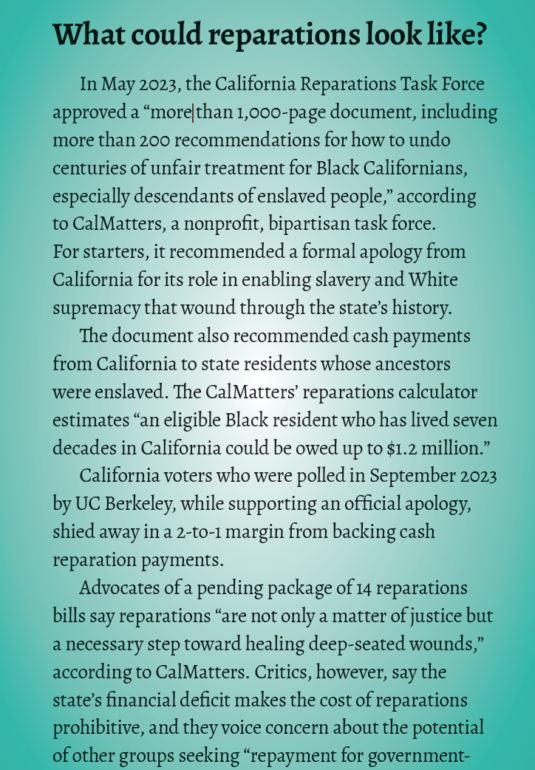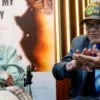Isaiah 58:12 reads, “Your ancient ruins shall be rebuilt; you shall raise up the foundations of many generations; you shall be called the repairer of the breach, the restorer of streets to live in.”
What does it mean to be “the repairer of the breach?” In 2023, Johnson C. Smith Theological Seminary (JCSTS) in Atlanta, Georgia, received $90,000 in funding from national foundations including the Ford Foundation and the Henry Luce Foundation to explore this question and invite conversations among people of faith. JCSTS President Paul Roberts and the seminary’s Reparations Coordinating Committee have spent more than a year convening in-person and digital consultation among predominantly Black faith leaders who represent seminaries, churches and other organizations, centering around advocacy, funding, sustainability and scalability of reparations.
Dartinia: We’ve talked nationally about reparations since the 1700s. Other countries have succeeded, like South Africa and West Germany. We have, also, in a way, succeeded with reparations for some of the Japanese American citizens who were interred during World War II. What’s the disconnect?
We’ve also talked as a denomination about reparations since the 1960s. But here we are. What can you tell us about the work leading up to this endeavor?
Paul: First and foremost, Johnson C. Smith Seminary is entering the national dialogue on this topic because we are interested in approaching it not merely as a civic enterprise but from the standpoint of faith. For us, the heart of the matter is the biblical mandate to conduct, encourage and enact efforts that lead to societal healing and repair and that reflect God’s justice in the world. We also are interested in hearing the perspective(s) of the African American religious community in the hope that JCSTS can help gather the Black church community around a coordinated national effort.
Going into this project, we knew of some of the visionary reparations work being done all over the country. Our studies indicated that most of these efforts are grassroots and localized. We were also keenly aware that H.R. 40, the congressional legislation first introduced in 1989 by Congressman John Conyers, has never made it out of the Senate. We believe that as a seminary we are well situated to help organize a national effort that works in tandem with grassroots efforts toward a common goal.
 Our first consultation occurred in January 2023, in Atlanta. It was super exciting. We didn’t know quite what to expect. We didn’t know where people would lean in or lean out. We just set the conversation table as best we could at the historic Ebenezer Baptist Church in Atlanta and people came! With Ebenezer’s help, we fellowshipped, broke bread, got to know one another and talked, and talked, and talked.
Our first consultation occurred in January 2023, in Atlanta. It was super exciting. We didn’t know quite what to expect. We didn’t know where people would lean in or lean out. We just set the conversation table as best we could at the historic Ebenezer Baptist Church in Atlanta and people came! With Ebenezer’s help, we fellowshipped, broke bread, got to know one another and talked, and talked, and talked.
We found that there is a wide cross-section of pastors, congregational leaders, and scholars who have a demonstrable interest in reparations through the lens of faith. Yet, among congregations represented at our consultations, there does not seem to be a lot of organized or intentional conversation about reparations.
Dartinia: That’s surprising.
Paul: We found it surprising, too. And we found that our learnings from the Atlanta conversation were reflected in each of the successive consultations which took place in Princeton, New Jersey, New York City, Chicago, and Washington D.C.
It appears that where conversations do take place they are among individuals and are rather isolated. While there are congregations approaching this work via a strategic effort, these do not seem to be the norm. Some pastors, we learned, have steered clear of the topic for fear of causing a rift within their membership. All of this suggests that the opportunity for JCSTS is to serve as both an educational resource and a relational resource.
We would like to help leverage the moral authority of the Black church in fostering public interest in repairing the historic breach of racial discrimination in the U.S. The current landscape of economic inequity across racial
groups remains unabated in U.S. culture. However, there does appear to be political will at various state and national levels for reparations planning, and history shows a robust truth and reconciliation planning process can lead to sustained change.
Dartinia: How long has the topic of reparations been on your mind? Have you always been an advocate?
Paul: Fifteen years ago, I wasn’t on board with reparations. I understood it conceptually but considered it impractical. I got bogged down on the mechanics of how a reparations program would work and I didn’t believe there was enough support to make it happen.
I reversed my opinion after coming across documents that belonged to my late parents. Walter and Thomasena Roberts were small business owners in the northeast when I was a young child in the 1960s. I was appalled to learn that they were subjected to systemic redlining practices in their town and that the business loan they received would be categorized today as predatory. When my parents’ business eventually failed, they made their peace with the situation and did okay for themselves, but my lingering question is, “had my hard-working parents been able to participate equitably in the fabric of America, who knows what they might have accomplished?” An overwhelming number of African Americans can justifiably ask the exact same question.
After much reflection, I have concluded that the United States I long to live in needs to find a way to heal itself from its oppressive legacy. This will not happen unless we as a country are able to enact a process for genuine truth-telling and societal repair — all the things that church people talk about and are aware of. And because we live in a capitalistic society, it’s impossible in my mind to achieve this without some sort of financial reckoning — reparations.
Dartinia: You use the language of healing often.
Paul: Healing was a central aspect of Jesus’ ministry. As he performed personal acts of healing, he also preached a prophetic gospel aimed at the societal ills of his day. Yes, I feel strongly about healing — personal and societal. I want to feel well in my body, and I want the U.S. to be well. Right now, it is not.
It is troubled. It is divided. And a house divided cannot stand. History bears me out on this.
I believe we are suffering the predictable consequences of centuries of White supremacist practices. It’s important to note here that every American, regardless of their racial identity, is affected by White supremacy, not just those who have been denied rights. White supremacy compromises the humanity of every human being. It bloats the identity of some and denies the identity of others. In this zero-sum game, there are no winners.
On the other hand, can you imagine what the gross national output of this country might be if we did a better job prioritizing the flourishing of all humans regardless of their ethnicity, gender identity, orientation or appearance? Every citizen would benefit. When we accept anything less we all lose.
Dartinia: At your seminar at Matthew 25 in Atlanta, you spoke about ways deeply embedded supremacist values affect behavior, and how for you as an African-American male, showing up in a particular space can be very different than it is for your White counterparts.
Paul: I have a story for you. When my youngest son was a senior in high school, he and five of his best buddies drove to Florida for spring break. My African American son drove one car, his White best friend drove the other. About two-thirds of the way through their trip they got pulled over for speeding by two different police officers. My son received a $200 speeding ticket. His White friend received a warning. One might shrug this off as an isolated instance in which two different officers made two different discretionary decisions — except that these occurrences are pervasive in American culture.
In discussing the situation with our son, my wife and I reminded him that he was in the state where Trayvon Martin was killed and that in addition to abiding by all the laws of the state, he should never assume that his safety was guaranteed.
As a parent, it’s heartbreaking to watch the psychological impact of these circumstances on your child. Over time, these traumas become health factors. It’s not the same for White children.
Dartinia: You’ve worked on this since early 2023. Where are you now, and what do you feel is next for this endeavor?
Paul: We’ve been able to synthesize what we’ve heard from faith leaders. Based on our learnings, we’re poised to establish a second level of this initiative in which we’ll design a strategy for connecting localized reparations efforts to one another, supporting congregational engagement, and educating people on the theology of repair and reparations.
For JCSTS, this is faith work. We want to be the kind of institution that supports and promotes reparations work from the standpoint of faith. That’s the defining characteristic here. That’s what we feel is unique to us.
Further, we recognize that church life is complicated. Congregations have cultures of their own, histories of their own. There is wisdom in creating and offering congregational resources that help them reckon with their histories and talk honestly about healing, repair and reparations. That’s one of the things that we’re attempting to do with the goal of further equity and justice in the world.
Dartinia: What makes this type of faith work complicated when it’s within the church?
Paul: Doing this work comes with a cost. Some pastors who broach this subject run the risk of losing their jobs. Even Dr. Martin Luther King was challenged by his members at Dexter Avenue Baptist Church in Montgomery, Alabama. That’s complicated. Recognizing these dynamics, one of the mandates of JCSTS is to be the agent that sets up the tables where leaders, activists, advocates can find community and establish mutually supportive relationships.
Johnson C. Smith Theological Seminary is embarking on something that’s new for us and core to our identity. Our dream is that in some way we can help change the very culture of this country, over the long haul, for the better.
Isaiah 58:12 reads, “Your ancient ruins shall be rebuilt; you shall raise up the foundations of many generations; you shall be called the repairer of the breach, the restorer of streets to live in.”
It’s important for us to know that reparation is a means toward something else: national unification, national health, national vitality, and a national understanding about our relationship to the divine and what it means to be really human.



